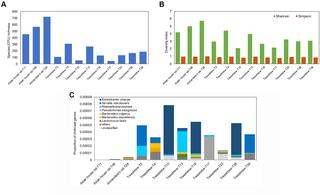当前位置:
X-MOL 学术
›
PLOS Biol.
›
论文详情
Our official English website, www.x-mol.net, welcomes your feedback! (Note: you will need to create a separate account there.)
Boosting natural history research via metagenomic clean-up of crowdsourced feces.
PLOS Biology ( IF 9.8 ) Pub Date : 2019-11-07 , DOI: 10.1371/journal.pbio.3000517 Amrita Srivathsan 1 , Niranjan Nagarajan 2, 3 , Rudolf Meier 1, 4
PLOS Biology ( IF 9.8 ) Pub Date : 2019-11-07 , DOI: 10.1371/journal.pbio.3000517 Amrita Srivathsan 1 , Niranjan Nagarajan 2, 3 , Rudolf Meier 1, 4
Affiliation

|
Biodiversity is in crisis due to habitat destruction and climate change. The conservation of many noncharismatic species is hampered by the lack of data. Yet, natural history research-a major source of information on noncharismatic species-is in decline. We here suggest a remedy for many mammal species, i.e., metagenomic clean-up of fecal samples that are "crowdsourced" during routine field surveys. Based on literature data, we estimate that this approach could yield natural history information for circa 1,000 species within a decade. Metagenomic analysis would simultaneously yield natural history data on diet and gut parasites while enhancing our understanding of host genetics, gut microbiome, and the functional interactions between traditional and new natural history data. We document the power of this approach by carrying out a "metagenomic clean-up" on fecal samples collected during a single night of small mammal trapping in one of Alfred Wallace's favorite collecting sites.
中文翻译:

通过宏基因组清理众包粪便,促进自然史研究。
由于栖息地遭到破坏和气候变化,生物多样性正处于危机之中。缺乏数据阻碍了许多非魅力物种的保护。然而,自然史研究(非魅力物种的主要信息来源)正在下降。我们在这里建议一种对许多哺乳动物物种的补救措施,即在常规田间调查中对粪便样本进行“宏源”清理,这些粪便样本是“众包”的。根据文献数据,我们估计这种方法可以在十年内产生大约1000种物种的自然历史信息。元基因组分析将同时产生饮食和肠道寄生虫的自然历史数据,同时增强我们对宿主遗传学,肠道微生物组以及传统和新自然历史数据之间的功能相互作用的了解。我们通过执行“
更新日期:2019-12-03
中文翻译:

通过宏基因组清理众包粪便,促进自然史研究。
由于栖息地遭到破坏和气候变化,生物多样性正处于危机之中。缺乏数据阻碍了许多非魅力物种的保护。然而,自然史研究(非魅力物种的主要信息来源)正在下降。我们在这里建议一种对许多哺乳动物物种的补救措施,即在常规田间调查中对粪便样本进行“宏源”清理,这些粪便样本是“众包”的。根据文献数据,我们估计这种方法可以在十年内产生大约1000种物种的自然历史信息。元基因组分析将同时产生饮食和肠道寄生虫的自然历史数据,同时增强我们对宿主遗传学,肠道微生物组以及传统和新自然历史数据之间的功能相互作用的了解。我们通过执行“


























 京公网安备 11010802027423号
京公网安备 11010802027423号